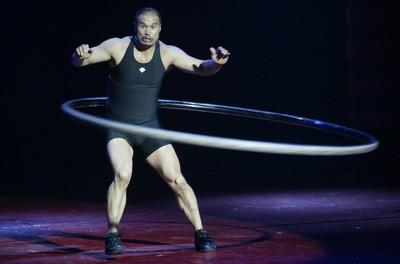‘MATSURI’

It’s not a unique sensation to walk out of a Las Vegas show feeling as though you enjoyed it more than you had any right to.
Some might even call that the very essence of Vegas entertainment: The dual appeal to those who haven’t seen a live show in years and those who know their way around a theater, but still cave to the guilty pleasures of a magic or a balancing act.
In the case of "Matsuri," it’s fairly easy to explain the likability of a Japanese acrobatics showcase that makes up in energy what it sometimes lacks in real content. Just look at the young faces of the 30-some performers and you see a convincing level of innocent joy there; not a trace of the insincere hackery often lurking behind the cheesy smiles of the usual suspects.
Also, it’s nice that some things still don’t translate in our wired world. Much of "Matsuri" still feels very, well, foreign, as though Richard Simmons and Charlie Chaplin were thrown together to put on a show tailored to Eastern sensibilities in a way that leaves you slightly shaking your head.
You might not always be down with the "Hooked on Disco" score or the crowd participation, but you’ll probably have fun because everyone else does.
Also known as the "Muscle Musical" in Japan, "Matsuri" visited the Riviera last year without teaching any lesson to the Russian ice revue that eventually inherited the showroom. The ice show chose to copy the look and overall aesthetic of Cirque du Soleil, while "Matsuri" escapes the shadow of Cirque and becomes a legitimate alternative, even while repeating some of the acrobatics.
The Riviera version also was a scaled-down afternoon production. This time, "Matsuri" is bigger and brighter, filling the larger stage at the Sahara with things that didn’t fit at the Riv: "Bungee birds" that keep popping out of a cuckoo clock in greater numbers, a female aerialist (Yuriko Imamura) who poses gracefully in a ring hanging over the stage while an elaborate dance scene with hula hoops unfolds on the ground.
The show is a great alternative to magic for the summer family trade. The stage erupts in color as the cast pours out in a wave of yelling and body slapping, showing that you can do crazy things with jump-ropes — like jumping it from a hand stand — and yo-yos.
Naoki Iketani gets the crowd on his side as he vaults over 9 feet of boxes. Keigoh Arizona bounces his mountain bike right down the steps of the stage and into the audience. A Day-Glo clown (Yasuaki Yoshikawa) spins himself around inside a giant wheel without snapping his spine.
A rare dramatic sequence has taiko drummers not pounding real drums, but using their feet to stomp wooden boxes sized to create specific tones. But really, the strength of the production is creator Ryoji Nakamura’s knack for silent-movie comedy.
There’s the one-two punch of a strongman (Hiromitsu Takahashi) who somehow makes a hula hoop out of a ring that’s large and heavy enough to be a truck wheel, and then a little guy (Yuya Yamada) who manages to keep the ring airborne by running around inside of it.
The best bit has the ensemble suited up as black and white piano keys. When Mai Tsuchiya sits down at a real electric piano to plunk out a melody, the corresponding "notes" have to do a push-up. One guy, Naoki Iketani, has to do more than most. It’s a great bit, one better seen than described — which is perhaps another reason why this show could have a long future on the Strip.